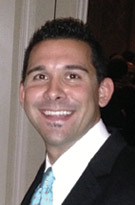In some instances, it is the family ties that carve a career path.
 Dustin BennettAfter installing foodservice equipment for Louisiana Food Service Equipment Inc. in Alexandria, La., during high school, Dustin Bennett decided to take a break from his family's business to go to college. After graduation, and a one-year stint working on an oil rig, he was drawn back into the family business in 2007, handling sales and bids, making Bennett the third generation of his family involved in the company.
Dustin BennettAfter installing foodservice equipment for Louisiana Food Service Equipment Inc. in Alexandria, La., during high school, Dustin Bennett decided to take a break from his family's business to go to college. After graduation, and a one-year stint working on an oil rig, he was drawn back into the family business in 2007, handling sales and bids, making Bennett the third generation of his family involved in the company.
FE&S: You are known for seeing a job all the way through to installation and even helping out with the installation. Why is this important?
DB: Chefs will have ideas in placing equipment and the customer experience they are looking for, so I'm involved in various aspects of the project. When it comes to the installation and being on-site, there are constant issues with equipment that need resolving and things you can't foresee, such as running necessary lines and building restrictions. When customers and contractors see someone they've dealt with over the phone actually out there getting their hands dirty and getting sweaty doing manual labor, they appreciate that. It builds a deeper relationship between me and the customer. This proves that I'm not just pushing paper and out to make money, but I care enough to be there to make sure everything is installed properly.
FE&S: How has your experience working with independent operators and bars helped you with some of the contract work that's now part of your client base?
DB: Restaurants and bars tend to be a lot more complicated due to owners and managers and the different opinions and egos involved. A contract job is more cut and dried. Dealing with the restaurant and bar industry has helped me learn to cope with difficult people and situations, which makes dealing with contract work easier.
FE&S: You work in a very food-centric market. What role does equipment play in supporting your customers' success?
DB: It's important to stay on top of all of the latest trends, whether it's a raised rail refrigerator or new pot or pan that accelerates cooking. Being aware of the latest and greatest units and items, and being able to recommend what is best-suited for my customers, is a priority of mine.
FE&S: Why is it important for you to develop relationships with people from all parts of your customer organizations?
DB: It's important to build relationships with customers because they will most likely come back and do business with me. I not only sell them good quality products but I'm always available. Everyone has my cell phone number because service is the most important thing. If something is broken, I will go out of my way to find the piece to fix it. This helps build long-lasting relationships with customers.
FE&S: What attracted you to this business?
DB: I like the culture and the everyday challenges. Products are constantly changing and problems are always popping up. It's almost impossible to have this job completely covered all of the time, but it's great to be a part of the food industry. I consider myself a total foodie.
FE&S: What's the most important lesson you have learned working as a DSR?
DB: It's always important to follow up, because the moment you don't, something will go wrong. Also, I never assume someone will do something that I ask them to do, and that emphasizes the importance of following up.



